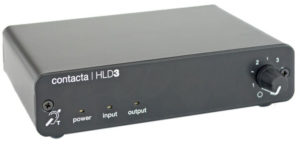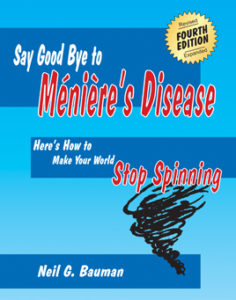by Neil Bauman, Ph.D.
© August, 2018
Numbers of people have asked me how I got into doing what I do now—helping people deal with their hearing losses and other ear-related conditions. They have wondered whether it was because I lost my hearing due to taking ototoxic drugs, and if that was why I became interested in the subject of drug ototoxicity.
The answer is “no”. Genetics, not drugs, was the cause of my hearing loss.
I seldom write about myself since my focus is on helping you, except when using myself as an example in explaining something related to ears. However, today I’m making an exception. Here’s the story of how I got into helping people with hearing loss and specifically into researching the field of drug ototoxicity.
Twenty-five years ago it had never even crossed my mind that drugs could damage our ears. That changed in 1994 when I was training to be a speechreading/hearing loss coping skills instructor under the Coping with Hearing Loss Independence Program (CHIP) in Alberta. In the third year of this course, we were given two handouts consisting of two or three pages each of drugs that were known or thought to damage ears. That was my brief introduction to ototoxic drugs.
After I had completed the course and began teaching speechreading and coping skills to hard of hearing people, I realized that for a number of reasons—poor health, blizzards, etc.—many hard of hearing people would not come to our classes. In order to remedy this, I had the bright idea that I would take all the information I had learned and distill it into a book so that hard of hearing people could learn to effectively cope with their hearing losses whether they could get to classes or not.
I gave this book the grandiose working title of “Everything You Wanted to Know about Your Hearing Loss but Were Afraid to Ask (Because You Knew You Wouldn’t Hear the Answers Anyway)!” Since this book was covering “everything” related to hearing loss, I obviously needed to include a chapter on ototoxic drugs. I used the two handouts as the basis for this chapter and supplemented it with other information I found. The result was a 13-page chapter on ototoxic drugs.
When I finished this chapter, I set it aside and worked on other chapters. Later, I came back to review this chapter and wondered if maybe, just maybe, I’d missed a drug or two. I began to research in earnest, using any drug books I could get my hands on, starting with the Physician’s Desk Reference (PDR) and the Canadian equivalent, The Compendium of Pharmaceuticals and Specialties (CPS) and a few other popular drug books that were readily available to me.
Five years later, after scouring tens of thousands of pages of fine print looking for ototoxic side effects, that little 13-page chapter had grown to be a whopping 696 page book called Ototoxic Drugs Exposed. The first edition came out in 2002 and a slightly revised 2nd edition in 2003.
(Incidentally, I never completed or published the Everything book. Instead, many of the chapters in this book, like the ototoxic drugs chapter, became books in their own right. All of my books in this series now carry the tagline, “Another book in the series: ‘Everything You Wanted to Know About Your Hearing Loss…’”.)
I continued to scour drug books and drug data-bases whenever I came across them. In addition to searching through a number of editions of the PDR and CPS, I carefully extracted ototoxic drug information from numerous other drug books and publications including various editions of Drug Facts and Comparisons, the PDR for Herbal Medicines, the British National Formulary, the AHFS Drug Information guide put out by the American Society of Health System Pharmacists, the Nursing Drug Handbook, the Essential Guide to Prescription Drugs and various online databases worldwide.
This culminated in the revised and expanded 798-page 3rd edition of Ototoxic Drugs Exposed which came out in 2010.
This book has steadily gained more and more credibility. For example, some years ago, to my surprise, I accidentally discovered that one audiology school was using Ototoxic Drugs Exposed as a required textbook in their Doctor of Audiology program!
I have continued collecting any ototoxic drug information wherever I find it and am slowly building in my computer what will become the 4th edition of this book. Because of the enormous amount of new data I’ve come across, when it comes out, perhaps in 2 years or so (as I have the time), I estimate this new 2-volume edition will be approximately 1,600 pages long!
In tandem with researching ototoxic drugs, I have worked on other related topics—tinnitus being one of them. My first book on tinnitus that I published back in 1998, When Your Ears Ring, was a short 56-page book. This book has grown over the years and now the 7th edition, which came out in 2016, is a comprehensive 356 page book called Take Control of Your Tinnitus.
In addition to these books, I have written more than 1,000 articles related to ears including more than 160 articles on ototoxic drugs and more than 100 articles on tinnitus. As people read these articles, they have hope that I may be able to help them. As a result, over the years I have answered thousands upon thousands of emails and phone calls from people all over the world and from all walks of life—from generals to movie stars to medical doctors whose own colleagues couldn’t help them, to college graduates to the average person on the street to people in third world countries—all seeking my help for various problems related to their ears.
The result? As I am helping people, I keep on learning more and more all the time. So although I am not a medical doctor or audiologist or pharmacist (my two doctorates are in totally unrelated fields), I have built up a fair bit of knowledge on these and other ear-related subjects. Thus I am able to educate and help many people successfully deal with issues related to their ears. That is why when people ask me what I do, I simply reply, “I help people.”



I’m glad you have devoted your life to this. It seems many GPs and others are oblivious to the subject.
Do some doctors and others in the medical field ignore you work because you are not a medical doctor?
Hi Nicole:
Many doctors ignore me and my research because a) I’m not a medical doctor and b) because they are taught little or nothing in medical school about the harm drugs do to people’s ears. Thus, they assume it doesn’t happen. And c) if they didn’t prescribe drugs, they wouldn’t have a clue how to help people–that’s basically all they learn regarding treating health problems. They don’t learn alternative medicine and holistic medicine and kindred subjects so the practice what they know–and that is drugs, drugs and more drugs. At least, that’s how I see it.
Cordially,
Neil
Your story is truly inspiring. I haven’t read any of your books but after reading this, they are on my wish list. thank you sharing such an incredible journey.
I only took 3 Ciprofaxacin tablets before deciding to switch to a safer antibiotic for my diverticulitis. But two days later I suffered severe tinnitus and profound hearing loss which began 04/24/21. I have been taking Magnesium, Vitamin C and D, Zinc and a supplement called Inner Ear Plus which has Vitamin C and all the B vitamins in it. I also began taking the supplement N-Acetyl_Cysteine. I am desperate to limit the damage to my cells, particularly the ones in my ears. My hearing continues to worsen! Do you have any advice for me?
Hi Laurie:
How do you know the current antibiotic isn’t also affecting your ears. Certainly the Ciprofloxacin could be the culprit.
You are taking a lot of good supplements. But are you taking them in therapeutic doses. For example, if I were in your shoes, I’d be taking the NAC in doses of around 1,800 mg a day, where the bottle probably says to take one a day (600 mg) or something like that.
For example, I take 10,000 IU of vitamin D3 daily and 1,000 mg Vitamin C daily as maintenance doses. The therapeutic dose would be much higher.
Since your hearing is continuing to drop, I’d certainly be leery of the other antibiotic you are still taking. It could also be causing hearing loss.
Cordially,
Neil
Hi. I am so exausted after a number of visits to different doctors.It started with all teeth aching. When the pain stopped,lympf nodes in throat were swollen.Doctors keep giving me different antibiotics,and most of them are ototoxic. I do not know what to do.
Hi Anne:
If the antibiotics aren’t helping, then don’t take them. Obviously you don’t have a bacterial infection. To me, it sounds like you have a viral infection–possibly you have a flu-like virus. That is what causes my teeth to ache, etc. and antibiotics don’t work with viruses.
Cordially,
Neil